€0.00 ex vat
Empty cart...
Discover our promotionsEco-responsible products
Bruneau is committed to our planet
Certified, with ecolabel, recycled... Because there is a wide variety of ecologically responsible products, Bruneau helps you to gain more insight in environmentally friendly, professional purchases.
Ecologically responsible
Eco-labelled products
certified by independent organisations
Ecologically responsible
Recycled products
manufactured from recycled material (at least 50%)
Ecologically responsible
Compostable or biodegradable products
which decompose and return to the environment
Ecologically responsible
Rechargeable products
that value reuse over purchase
Ecologically responsible
Refurbished products
to give a second life to products still in good condition
Ecologically responsible
Products designed to be disassembled
for repair and durability
Ecologically responsible
Plant-based products
to put an end to the use of plastic
Ecologically responsible
Solvent-free products
that do not pollute the planet and protect health
AND MUCH MORE!
Please note that at Bruneau, "recyclable" products are not considered environmentally friendly because they are not always actually recycled.
Ecolabels and certifications
To avoid any greenwashing, Bruneau relies on European and worldwide labels and certifications with strict specifications. Thus, only labels awarded by independent certifying organisations are considered "eco-responsible".
Public ecolabels
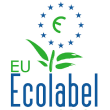
The EU Ecolabel is a label created by the European Commission in 1992 to enable consumers to identify the most environmentally friendly products throughout their life cycle. It is recommended by the French Environment and Energy Management Agency (ADEME) for its environmental performance. This label applies to a large number of products (paper, detergents, soap, paper towels, etc.).
Guarantees
The ecological criteria defined are such that only a maximum of 10-20% of products on the market can be awarded the EU Ecolabel. Depending on the product category, the following environmental impacts are taken into account: energy consumption, emissions to air and water, ban on the use of toxic substances, packaging waste, organic farming and recycled materials. Packaging and communication must provide clear information on the use, dosage and hazards of the products.
Control
The label is administrated by the European Commission. Monitoring is carried out by independent bodies.
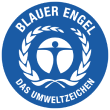
Der Blauer Engel (literally "Blue Angel") is an eco-label created in 1978 by the German Ministry of Internal Affairs.
Guarantees
The label analyses the product's life cycle, its impact on the climate, the use of raw materials and pollution. It guarantees the use of sustainable materials, energy efficiency (low energy consumption), ease of repair and recycling and ergonomics (noise, comfort). It also prohibits the use of toxic and hazardous substances and guarantees a low level of pollution of soil, air and water.
Control
The German Institute for Health, Quality and Labelling (RAL) ensures an independent control of the individual files.
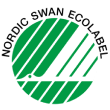
The Nordic Swan Ecolabel is a Scandinavian label created in 1989 to reduce environmental impact of production and consumption of products. It covers over 200 types of products and applies separate criteria for each.
Guarantees
Depending on the product, the label takes into account: energy consumption, emissions to air and water, ban on harmful substances, packaging waste, organic farming, recycled materials, etc. Packaging and communication must provide clear information on the use, dosage and hazards of the products.
Control
This label is managed by the Nordic Ecolabelling Board, which consists of representatives from various Nordic authorities that want to promote sustainable consumption. Monitoring is carried out by independent bodies.
Forestry ecolabels
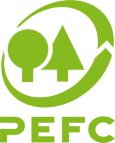
The Programme for the Endorsement of Forest Certification schemes (PEFC) is an international label established in 1999 aimed at sustainable forest management. The PEFC system is the largest forest certification system in the world with more than 330 million hectares of certified forest area spread over all continents. The PEFC label promotes a balance between the economic, societal and environmental functions of the forest.
Guarantees
PEFC is an independent non-governmental organisation that offers voluntary foresters certification in exchange for compliance with the requirements of the PEFC sustainable forest management standards. Among its commitments: favouring diversity, choosing intervention periods so as not to disturb animal reproduction periods, not using GMOs, guaranteeing the game/forest balance, respecting the forest space, replanting, conserving dead trees, etc.
The PEFC mark guarantees the origin and traceability of the wood but does not intervene in the manufacturing process of the finished products. It has 2 labels:
- "PEFC certified": paper marked with this label contains at least 70% virgin fibres. The remaining 30% is derived from controlled sources.
- "PEFC-recycled": products with this mark contain at least 70% recycled paper.
Controle
The programme seeks a balance between the ecological, social and economic functions of forestry. All stakeholders are thus involved in the life of the organisation: forest owners, industry, environmental organisations, the scientific community and other forest users. Controls are carried out by independent certification bodies approved by the public authorities.
Affiliation
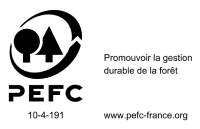
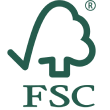
The Forest Stewardship Council® (FSC®) is an international NGO, which has been promoting for more than 25 years environmentally appropriate, socially beneficial and economically viable forest management.
Guarantees
FSC elaborates demanding standards for the certification of forests or companies that process and market forest products.
The rules for forest management include 10 main principles and 70 criteria, which must be applied in all FSC-certified forests around the world, such as maintaining ecosystem services (services provided to society by forests), preserving biodiversity, respecting laws and workers' rights, and taking into account indigenous peoples and local communities.
The label is available in three variants:
- FSC 100% label: the product is made from 100% fibres from FSC certified forests.
- FSC Recycled: the product is made of 100% recycled content.
- FSC Mixed: the product is made from a mixture of fibres from different origins; at least 70% of the fibres are from FSC-certified forests and/or recycled fibres. The remaining 30% comes from recycled fibres and/or controlled wood.
Governance and control
FSC members are organised into three chambers (one environmental, one social and one economic). They are represented by environmental organisations such as WWF, indigenous peoples' representatives, forest owners, industrialists, retailers, brands, consumer associations and trade unions. Thanks to this democratic and balanced governance, FSC relies on the market to create and provide users with robust, innovative and audited tools for responsible forest management.
All links in the supply chain are audited annually by external certification bodies.
Affiliation
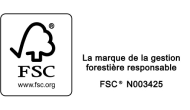
French certifications
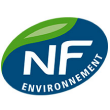
NF Environnement is a French label founded in 1991 for environmentally friendly products. This label can be found on a large number of product categories: furniture, laser print cartridges, stationery, notebooks, envelopes, cleaning products, rubbish bags, etc. The label guarantees an environmentally friendly production method and high quality (both through compliance with standards and by limiting the environmental impact throughout the life cycle, from manufacturing to disposal).
Guarantees
NF Environnement certifies only quality products with a reduced impact on the environment. Limitation of emissions of volatile organic compounds, minimum percentage of recycled or renewable material in the composition of the product, limitation of substances hazardous to human health, products from sustainably managed forests, system of recovery and reuse of print cartridges, product durability, etc. Products are tested for their effectiveness.
Control
The label is managed by the Association française de normalisation (Afnor), a public-interest foundation in charge of standardisation. Afnor is assisted by the French Eco-Label Committee, which is composed of professionals, associations, public authorities and technical bodies. The aim is to ensure balance and parity between professionals and environmental associations.
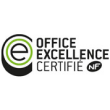
NF-Office Excellence Certifié (NF-OEC) is a French label dedicated to office furniture. It was created as a result of the desire of office furniture manufacturers to commit to environmental and societal responsibility beyond the mere quality of the products.
Guarantees
Limitation of environmental impact, durability, recyclability of products, safety, adaptability of the product, fire resistance, quality of workmanship, etc. NF-OEC certified furniture guarantees an environmental and societal dimension of the product, in addition to technical excellence. It is only awarded if the manufacturer's commitment is quantifiable and measurable.
Control
NF-OEC certification is guaranteed by the French Association for Standardisation (Afnor) on the basis of work carried out and validated by the stakeholders (representing manufacturers, buyers, users, technical and administrative bodies). It is issued by the technological institute Forêt Cellulose Bois Construction Ameublement (FCBA). This totally independent organisation carries out numerous tests and checks on societal, environmental and quality compliance.
Agricultural ecolabels
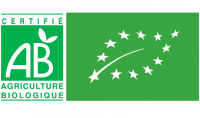
The EU organic label Euro-leaf has been obligatory in the European Union on all organically produced products that comply with the European organic regulations since 1 July 2010. It is optional for imported products.
Agriculture Biologique (AB) is a French label founded in 1985 to promote organic farming, which guarantees an ecological method of producing food.
Guarantees
The guarantees of Eurofeuille and AB are identical. To qualify for certification, unprocessed products must be 100% organic and processed products must contain at least 95% organic ingredients. The label prohibits the use of artificial fertilisers, chemical pesticides, genetically modified organisms, chemical fertilisers and synthetic pesticides. Only approved additives may be used.
Control
From producer to distributor, practices are regularly checked by certification bodies approved by the public authorities (INAO in France) to guarantee quality products for the consumer.
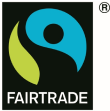
Fairtrade is an international label founded in 1988 under the name "Max Havelaar" to promote fair trade with countries in the South. It guarantees good working conditions and includes a series of ecological criteria. The label supports farmers and their communities financially through a minimum price and a premium. Since 2016, the label is no longer limited to the agricultural phase but also looks at the further stages of the chain, such as processing.
Guarantees
Fairtrade focuses on environmentally friendly agricultural practices aimed at protecting and conserving biodiversity. The label emphasises limited and safe use of chemicals, waste management, erosion control, preservation of soil fertility and responsible water management. It prohibits the felling of primary forests and the use of genetically modified organisms and the most harmful pesticides. However, the use of fertilisers is permitted.
Control
The control is carried out by FLOCERT, an independent organisation accredited by the German authorities. For certain criteria, the label offers the farmer a maximum of 6 years to comply with the Fairtrade specifications.
The multi-disciplinary certification body
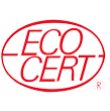
Ecocert is a French certification body created in 1991 which nowadays has gained an international dimension. It is accredited to certify numerous labels such as Organic Agriculture, PEFC, FSC... In addition, since 2002, it has been developing its own eco-responsible certification standards, particularly for cosmetic products (Ecocert Cosmos) and detergent cleaning products (Ecodetergent).
Guarantees
The label stands for production that respects living ecosystems, better management of natural resources (water, air, soil fertility) and energy, socially responsible sectors, better product quality and safety.
Control
The Ecocert label is awarded and controlled by the organisation of the same name. Like any certification body, Ecocert is accredited by the Comité Français d'Accréditation (COFRAC), the only state-appointed accreditation body in France. COFRAC is a non-profit association with a public mission: to ensure the competence and impartiality of conformity assessment bodies (CABs), also known as inspection bodies.